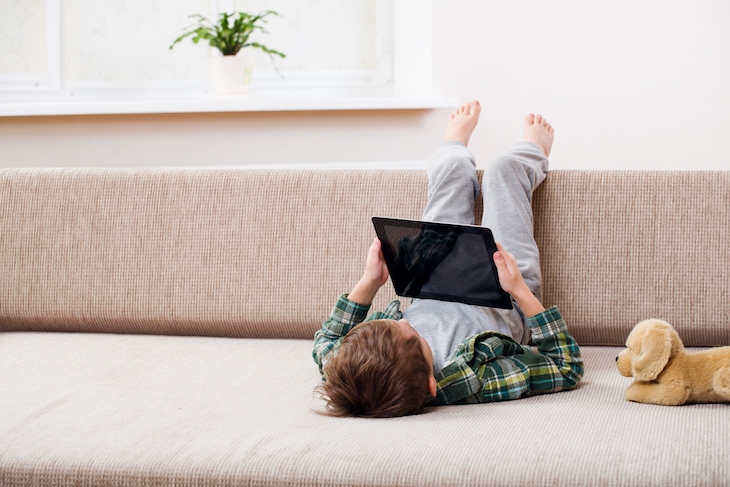Over Christmas, Caroline and I finally snapped about the amount of time our children were spending on their screens. If they weren’t watching Logan Paul vlogs on YouTube, they were on Snapchat or playing video games. I couldn’t get them to read anything — not even one of the wonderful How to Train Your Dragon books — and attempts to persuade them to go on walks were met with fierce resistance. Towards the end of the holidays they began to look and act like drug addicts — pallid complexions, easily distracted, short-tempered. Perhaps they really were addicts.
Any parent who has tried to limit their child’s screen time will be familiar with the standard objection: ‘But Dad, you’re always on your screen.’ That’s true, but the difference is that I’m on a Kindle reading a book. In the past, I scoffed at bibliophiles who claimed that something was lost when we switched to reading on screens, but I now realise they were right. We’ve lost the ability to set a good example to our children. Kids brought up in houses surrounded by books are supposed to have an advantage over those who aren’t, but it’s hard to see how children benefit if those books are never opened. As far as mine are concerned, Mummy and Daddy are just on screens too.
Does spending too much time on smartphones hinder children’s cognitive development? I’m usually pretty sceptical when people make those claims, but I heard it from a source I respect last year: James Flynn, the eminent political scientist who gave his name to the ‘Flynn effect’. This is the well-documented phenomenon whereby average cognitive ability, as measured by intelligence tests, has been steadily increasing in the United States and other countries since 1930. Until now, that is.
I attended a conference in Montreal in July where Flynn presented his latest findings, namely, that IQ is still increasing in the developing world, but has started to decline across the West. If you ask 14-year-olds in Britain to take the same tests that 14-year-olds took in 1980, they score significantly worse. Flynn speculated that one possible explanation is the prevalence of smartphones and the amount of time British teenagers spend on social media.
This is known as the ‘anti-Flynn effect’ and, after seeing how brain-dead our children became during the holidays, Caroline and I decided we had to take the situation in hand. But how? In the past, our attempts to restrict screen time have always ended in failure because neither of us has had the energy to enforce the rules for more than about two weeks. But Caroline had heard about an app called OurPact that would let her choose what apps the children could launch via a control panel on her own phone. Instead of the two of us trying to take our children’s devices off them during certain parts of the day — never a pleasant experience — she could simply deactivate Snapchat, YouTube, Netflix… everything apart from the Kindle app. They’d get to keep their phones, but all they’d be able to do on them for certain periods of the day would be to read books.
The hard part, of course, is installing the app on your children’s phones. As you can imagine, they’re pretty reluctant to part with them, knowing what you’ve got in mind. You then have to persuade them to cough up their passcodes and, if we’re talking about iPhones, their Apple IDs as well. I cannot tell you how much cajoling and threatening that took. Agreeing which apps they’d be allowed to use at what times of day was like negotiating the Oslo Accords. It took days.
There were also teething problems. For instance, we didn’t bother to deactivate the ‘News’ feature on their phones — we want them to keep up with current affairs — and my 12-year-old son quickly discovered that it provided a gateway to YouTube. Luckily, he couldn’t help boasting about this — ‘I’ve hacked your stupid app’ — so we were able to close
that loophole.
We’ve now got the system up and running and it’s pretty good. Not that they’ve started reading books on their phones, mind you. Instead, during the restricted hours they just toss them aside and start watching reruns of Friends on television. But that feels like a step in the right direction. Compared to Snapchat, it seems positively wholesome. Now, if we can just find an app that immobilises the telly…







Comments